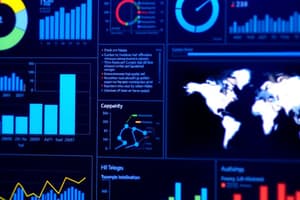Podcast
Questions and Answers
What is the primary purpose of Business Intelligence (BI)?
What is the primary purpose of Business Intelligence (BI)?
- To support improved decision making (correct)
- To predict future trends and behaviors
- To visualize data in a graphical format
- To extract and transform data
What is the term for a graphical representation of the steps a consumer takes in making a purchase decision?
What is the term for a graphical representation of the steps a consumer takes in making a purchase decision?
- Conversion Funnel (correct)
- Drill-Down Analysis
- Data Cube
- Dashboard
What is the term for a visual depiction of a set of words grouped by frequency of occurrence?
What is the term for a visual depiction of a set of words grouped by frequency of occurrence?
- Data Visualization
- Word Cloud (correct)
- Linear Regression
- Online Analytical Processing (OLAP)
What is the term for an interactive examination of high-level summary data to gain insight into certain elements?
What is the term for an interactive examination of high-level summary data to gain insight into certain elements?
What is the primary purpose of a Key Performance Indicator (KPI)?
What is the primary purpose of a Key Performance Indicator (KPI)?
What is the term for a presentation of a set of KPIs about the state of a process at a specific point in time?
What is the term for a presentation of a set of KPIs about the state of a process at a specific point in time?
What is the term for a mathematical procedure to predict the value of a dependent variable based on a single independent variable?
What is the term for a mathematical procedure to predict the value of a dependent variable based on a single independent variable?
What is the term for a structured approach for the planning and execution of a data mining project?
What is the term for a structured approach for the planning and execution of a data mining project?
What is the primary function of Data Visualization?
What is the primary function of Data Visualization?
What is the main purpose of Online Analytical Processing (OLAP)?
What is the main purpose of Online Analytical Processing (OLAP)?
What is the primary benefit of using Drill-down analysis?
What is the primary benefit of using Drill-down analysis?
What is the main goal of Data Mining?
What is the main goal of Data Mining?
What is the primary purpose of a Dashboard?
What is the primary purpose of a Dashboard?
What is the main benefit of Self-Service Analytics?
What is the main benefit of Self-Service Analytics?
What is the primary function of a Data Cube?
What is the primary function of a Data Cube?
What is the main purpose of Linear Regression?
What is the main purpose of Linear Regression?
Flashcards are hidden until you start studying
Study Notes
Business Intelligence (BI)
- A wide range of applications, practices, and technologies for extracting, transforming, integrating, visualizing, analyzing, interpreting, and presenting data to support improved decision making.
Data Visualization
- Presentation of data in a pictorial or graphical format.
- Examples: Word cloud, Conversion funnel.
Data Analysis Tools
- Online Analytical Processing (OLAP): analyzes multidimensional data from multiple perspectives, enabling users to identify issues, opportunities, and perform trend analysis.
- Data cube: a collection of data containing numeric facts (measures) categorized by dimensions (e.g., time, geography).
- Drill-down analysis: interactive examination of high-level summary data to gain insight into specific elements.
Data Mining
- Exploration of large amounts of data to discover hidden patterns, predict future trends and behaviors for decision making.
- Cross-Industry Process for Data Mining (CRISP-DM): a six-phase structured approach for planning and executing data mining projects.
Performance Metrics
- Key Performance Indicator (KPI): a metric tracking progress in executing chosen strategies to attain organizational objectives and goals.
- KPI consists of a direct measure, target, and time frame.
- Dashboard: a presentation of a set of KPIs about the state of a process at a specific point in time.
Analytics Self-Service
- Training, technology, and processes that empower end-users to work independently, accessing data from approved sources to perform their own analysis using endorsed tools.
Business Intelligence (BI)
- A wide range of applications, practices, and technologies for extracting, transforming, integrating, visualizing, analyzing, interpreting, and presenting data to support improved decision making.
Data Visualization
- Presentation of data in a pictorial or graphical format.
- Examples: Word cloud, Conversion funnel.
Data Analysis Tools
- Online Analytical Processing (OLAP): analyzes multidimensional data from multiple perspectives, enabling users to identify issues, opportunities, and perform trend analysis.
- Data cube: a collection of data containing numeric facts (measures) categorized by dimensions (e.g., time, geography).
- Drill-down analysis: interactive examination of high-level summary data to gain insight into specific elements.
Data Mining
- Exploration of large amounts of data to discover hidden patterns, predict future trends and behaviors for decision making.
- Cross-Industry Process for Data Mining (CRISP-DM): a six-phase structured approach for planning and executing data mining projects.
Performance Metrics
- Key Performance Indicator (KPI): a metric tracking progress in executing chosen strategies to attain organizational objectives and goals.
- KPI consists of a direct measure, target, and time frame.
- Dashboard: a presentation of a set of KPIs about the state of a process at a specific point in time.
Analytics Self-Service
- Training, technology, and processes that empower end-users to work independently, accessing data from approved sources to perform their own analysis using endorsed tools.
Studying That Suits You
Use AI to generate personalized quizzes and flashcards to suit your learning preferences.





